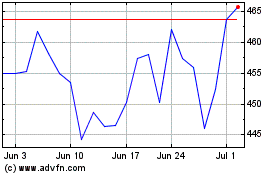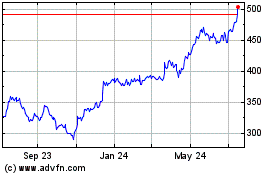Goldman Takes Aim At Private Equity -- WSJ
February 23 2018 - 3:02AM
Dow Jones News
By Dawn Lim and Laura Kreutzer
This article is being republished as part of our daily
reproduction of WSJ.com articles that also appeared in the U.S.
print edition of The Wall Street Journal (February 23, 2018).
Goldman Sachs Group Inc. said it raised $2.5 billion to buy
minority stakes in private-equity firms, betting on an industry
that is commanding increasing influence as more businesses choose
to stay private longer.
Petershill, a group within Goldman's asset-management arm,
originally had targeted $2 billion for the fund.
Goldman is zeroing on an industry that has secured a record
amount of dollars from pensions and endowments in recent years to
buy and lend money to businesses. U.S. private-equity firms raised
over $362 billion in 2017, the most money in a year since 2007,
according to LP Source, a data provider owned by Dow Jones &
Co., publisher of The Wall Street Journal.
These firms can be attractive targets for investors who want to
hold long-term stakes, as the firms' funds typically lock up the
money of major institutions for at least a decade, earning fees and
a cut of profits along the way. The investment pool Goldman raised
for the strategy, which includes Petershill Private Equity LP and
other related funds, channels the approach of Warren Buffett's
Berkshire Hathaway Inc., in that it doesn't set deadlines to exit
its bets.
Over time, Goldman could cash in on the positions by selling
stakes to investment managers and other buyers. It also could take
a portion of the portfolio public, making it available for
individual investors and mutual funds to invest in. There is no
guarantee Petershill will make these moves. If Goldman does list a
pool of manager stakes, it would further open up a market that has
largely been out of the reach of mom-and-pop investors. The
majority of private-equity firms don't list their shares publicly,
and their funds typically don't accept money from small investors.
This means that only large institutions, such as pensions and
endowments, as well as the ultrarich have broad exposure to the
asset class.
"If you're a public investor, there are not a lot of ways to
invest in private equity through the public markets," said Michael
Brandmeyer, co-chief investment officer of Goldman's alternative
investments and manager selection group, in which the Petershill
unit is housed. "We think there could be a potentially enthusiastic
audience for a listing."
Goldman already has put a chunk of its new fund to work,
acquiring minority stakes in private-equity firms.
The fund generally will buy passive stakes in midsize firms with
assets of $5 billion to $20 billion that Goldman believes have
potential to expand.
The latest Petershill pool has taken stakes in
technology-focused firm Accel-KKR, energy-infrastructure investor
ArcLight Capital Partners and oil-and-gas manager Riverstone
Holdings.
These sorts of transactions set a price tag for private-equity
firms, allowing founders to put a dollar figure on the wealth they
have created and paving the way for some of them to transfer
ownership to other executives. Firms that sell a minority stake can
use the new cash to fund expansion efforts. The Petershill unit
also can act as a sounding board for the firms it backs.
"Many organizations are collections of excellent investors,"
said Christopher Kojima, who heads Goldman's alternative
investments and manager selection group, which oversees more than
$200 billion. "But many of them might not be institutions."
The first Petershill fund, which Goldman launched in 2007 to
invest in hedge funds, delivered 2.5 times its investor money, even
as many hedge funds across the industry delivered disappointing
returns and bled investor money. Goldman exited all hedge-fund
positions in that pool after it struck a deal to sell stakes in
five managers to Affiliated Managers Group Inc. for about $800
million in 2016.
Goldman continues to manage a pool of hedge-fund interests from
another $1.5 billion Petershill fund, taking the view that sound
firms can deliver returns even as the industry faces
challenges.
"Our focus is on firms with their best years ahead of them,"
said Mr. Kojima.
Goldman made its first direct investment in a private-equity
firm in 2016 when it acquired a minority stake in Littlejohn &
Co. It joins a number of other investment firms -- including
Neuberger Berman Group LLC's Dyal Capital Partners, Blackstone
Group LP and Carlyle Group LP -- that are pursuing stakes in
private-equity firms as well.
Write to Dawn Lim at dawn.lim@wsj.com and Laura Kreutzer at
laura.kreutzer@wsj.com
(END) Dow Jones Newswires
February 23, 2018 02:47 ET (07:47 GMT)
Copyright (c) 2018 Dow Jones & Company, Inc.
Goldman Sachs (NYSE:GS)
Historical Stock Chart
From Mar 2024 to Apr 2024

Goldman Sachs (NYSE:GS)
Historical Stock Chart
From Apr 2023 to Apr 2024
